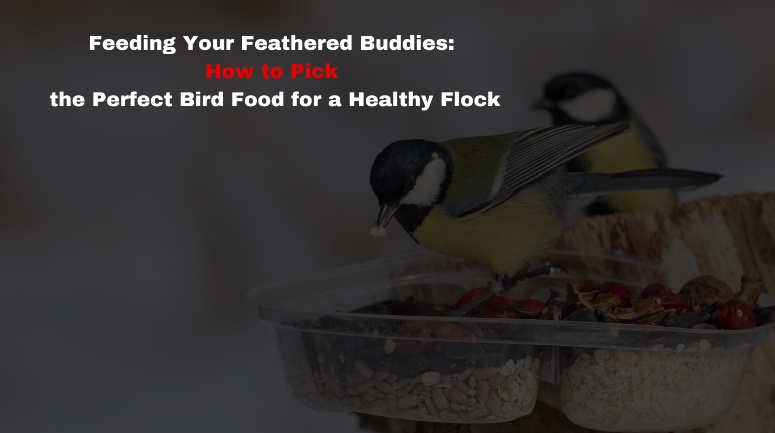Introduction:
Feeding pet birds is not just about filling up their bowls with seeds; it's about providing them with a balanced and nutritious diet to support their overall health and well-being. With a wide variety of bird foods available on the market, choosing the right diet for your feathered companions can be a daunting task. In this comprehensive guide, we'll explore the key factors to consider when selecting bird food, understand the nutritional needs of different bird species, and provide tips for maintaining a healthy flock.
- Understanding Bird Nutritional Needs:
Birds have unique dietary requirements based on their species, size, age, and activity level. While seed-based diets are common, they may not provide all the essential nutrients that birds need to thrive. Key nutrients required by birds include:
- Protein: Protein is essential for muscle development, feather growth, and overall health. Birds require high-quality sources of protein, such as lean meats, eggs, legumes, and nuts, to meet their protein needs.
- Carbohydrates: Carbohydrates are a source of energy for birds, providing fuel for daily activities and metabolic processes. Healthy sources of carbohydrates include whole grains, fruits, and vegetables, which also provide essential vitamins, minerals, and fiber.
- Fats: Fats are concentrated sources of energy and play a crucial role in maintaining healthy skin, feathers, and organ function. Birds require a mix of healthy fats, such as omega-3 and omega-6 fatty acids, derived from sources like nuts, seeds, and oils.
- Vitamins and Minerals: Birds need a wide range of vitamins and minerals to support various physiological functions, including immune function, bone health, and reproductive health. Fresh fruits, vegetables, and fortified bird pellets are excellent sources of essential vitamins and minerals for birds.
- Types of Bird Food:
There are several types of bird food available, each designed to meet the specific nutritional needs of different bird species. Common types of bird food include:
- Seed Mixes: Seed mixes are a popular choice for feeding birds, but they may not provide complete nutrition on their own. Look for seed mixes that include a variety of seeds, grains, and nuts to offer a balanced diet. Avoid mixes with fillers, such as cracked corn or milo, which have low nutritional value.
- Pelleted Diets: Pelleted diets are formulated to provide complete and balanced nutrition for birds. These extruded pellets contain a blend of grains, seeds, vitamins, and minerals, ensuring that birds receive all the essential nutrients in every bite. Pelleted diets are available for different bird species and life stages, making them a convenient option for bird owners.
- Fresh Foods: Fresh foods, such as fruits, vegetables, and cooked grains, can supplement a bird's diet with essential vitamins, minerals, and antioxidants. Offer a variety of fresh foods to provide dietary diversity and enrichment for your birds. Be sure to wash fruits and vegetables thoroughly and remove any seeds or pits that may be toxic to birds.
- Treats: Treats can be offered occasionally as a special reward or as part of a balanced diet. Choose treats that are nutritious and low in sugar and fat, such as dried fruits, unsalted nuts, and whole grains. Avoid offering sugary or high-fat treats, as they can contribute to obesity and other health issues in birds.
- Selecting the Right Bird Food:
When selecting bird food for your feathered friends, consider the following factors:
- Species-Specific Needs: Different bird species have different dietary requirements, so choose bird food that is appropriate for your bird's species and size. Consult with your veterinarian or an avian nutritionist for recommendations on the best diet for your bird.
- Nutritional Content: Read the labels carefully to determine the nutritional content of the bird food. Look for foods that are formulated to meet the specific needs of your bird species and life stage, such as maintenance, breeding, or molting.
- Quality Ingredients: Choose bird food made with high-quality, natural ingredients that are free from artificial colors, flavors, and preservatives. Avoid foods with fillers, additives, or ingredients that your bird may be allergic to.
- Variety: Offer a variety of foods to ensure that your birds receive a balanced diet. Rotate different types of bird food, including seeds, pellets, fresh fruits, and vegetables, to provide dietary diversity and enrichment.
- Feeding Guidelines:
Establishing a regular feeding schedule and portion control is essential for maintaining a healthy weight and preventing overeating in birds. Follow these guidelines for feeding your feathered buddies:
- Offer fresh food and water daily, and clean food and water dishes regularly to prevent bacterial growth and contamination.
- Monitor your bird's appetite, body condition, and droppings to assess their overall health and nutritional status. Adjust portion sizes and food types as needed based on your bird's individual needs and preferences.
- Provide enrichment activities, such as foraging toys, puzzle feeders, and bird-safe branches, to stimulate your bird's natural instincts and prevent boredom.
Conclusion:
Feeding your feathered buddies a balanced and nutritious diet is essential for their health, happiness, and longevity. By understanding their nutritional needs, selecting high-quality bird food, and following proper feeding practices, you can ensure that your birds receive the essential nutrients they need to thrive. Remember to consult with your veterinarian or an avian nutritionist for personalized recommendations and guidance on providing optimal nutrition for your feathered friends


No comments yet